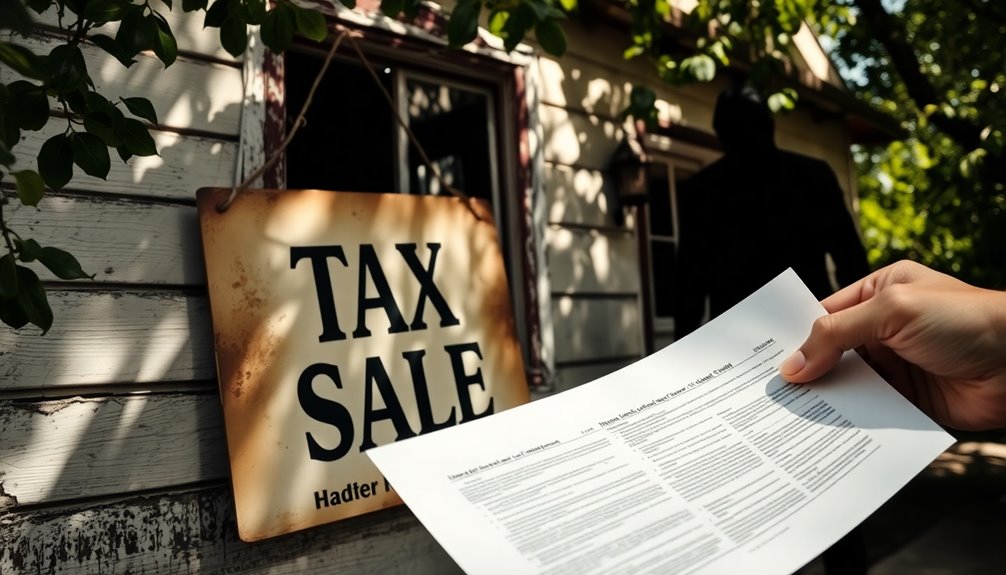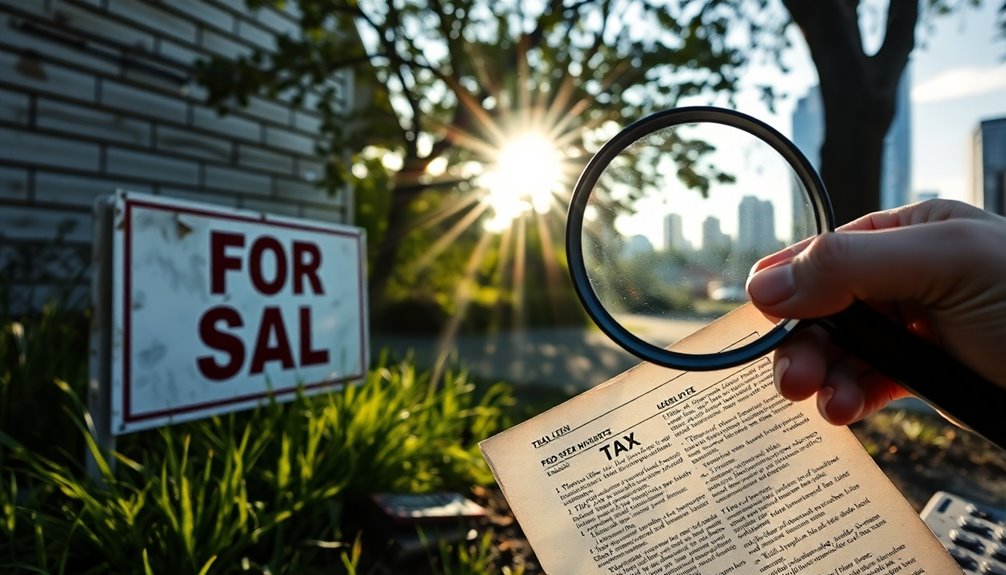To buy homes for back taxes, you need to understand tax liens and participate in local auctions. Start by researching properties with unpaid taxes through your county's tax assessor. Check online platforms for upcoming auction listings. Attend the auctions and bid based on the minimum amounts set. Remember, winning bids mean you'll need to pay promptly to secure your purchase. Afterward, secure and record your tax deed with the county. It's crucial to consider the property's condition and potential legal issues, as these can affect your investment. Keep going, and you'll uncover more strategies for success!
Key Takeaways
- Research local tax lien and deed sales through county offices or online platforms to find properties with outstanding taxes.
- Attend tax auctions to bid on properties, ensuring you understand the bidding process and minimum bid requirements.
- Conduct thorough inspections of properties to assess their condition and estimate repair costs before making any bids.
- Be aware of redemption periods; homeowners may reclaim properties during this time, affecting your investment strategy.
- Ensure compliance with local laws and regulations throughout the acquisition and renovation process to avoid legal complications.
Understanding Tax Liens and Deeds

Understanding tax liens and deeds is crucial for anyone looking to invest in properties with unpaid taxes. A tax lien is a legal claim by a local government when a property owner fails to pay their taxes. This lien prevents the property from being sold or refinanced until the owed taxes are settled. The municipality issues a tax lien certificate, detailing the amount owed, including interest or penalties.
There are various types of tax liens, including federal, state, and local. Federal tax liens arise from unpaid federal taxes and affect all the taxpayer's properties. In contrast, property tax liens specifically deal with unpaid property taxes and can be auctioned off to investors. These liens have priority over other claims, including mortgage liens. A tax lien attaches to all assets, which can significantly impact the property owner's financial situation.
When you buy tax lien certificates at public auctions, you're essentially investing in the unpaid taxes. You'll bid on interest rates or premiums, and once the property owner repays, you earn interest income.
However, if they fail to pay, you could potentially foreclose on the property, gaining ownership. Understanding these dynamics is essential to navigate this investment landscape effectively.
Researching Delinquent Properties

When you're ready to invest in properties with unpaid taxes, researching delinquent properties is essential. Start by checking public records at your local county tax assessor or treasurer's office. These records are typically available online or in person. Many county websites list properties with outstanding tax liabilities, making it easier to find potential investments.
You can also use specific online platforms that provide alerts and lists of properties under tax lien or deed sale.
Once you've identified delinquent properties, conduct drive-by inspections to assess their condition. Look for major red flags or signs of deferred maintenance, as properties may deteriorate further before you gain possession. Additionally, be aware that tax lien certificates are issued by municipalities for unpaid taxes, which can impact your investment strategy.
Calculate the After Repair Value (ARV) to estimate repair costs and potential return on investment (ROI).
Don't forget to perform thorough title searches to uncover any additional liens or legal issues. Understanding state-specific laws, including redemption periods, is crucial to avoid unexpected costs.
Finally, consult real estate professionals who specialize in tax lien certificates and tax deed sales for valuable insights. All these steps will help you make informed decisions as you navigate the world of delinquent property investments.
Participating in Tax Lien Auctions

Tax lien auctions present a unique opportunity for savvy investors looking to capitalize on properties with unpaid taxes. These public auctions allow municipalities to recover delinquent real property taxes by selling tax liens, either online or in person. The rules governing these auctions vary by location, so you'll need to familiarize yourself with your local regulations. Typically, auctions occur annually or within a short time frame, and you should check your county's treasurer's website for specific dates and details. When participating, you can bid by offering the lowest interest rate below a set maximum or by providing the highest cash amount.
Remember, winning a bid only entitles you to receive the lien amount plus interest, not ownership of the property—unless the owner fails to pay and you choose to foreclose. This process is allowed in 29 states and Washington, D.C., making it essential to know your jurisdiction's rules before investing.
Preparation is crucial; calculate your break-even point and understand local market values to make informed bids. Keep in mind that while you can earn interest on the lien, there's a risk the property owner may quickly pay off the debt, potentially limiting your profits. Stay informed and strategic to maximize your investment.
Steps for Buying Tax Deeds

Buying tax deeds can be a lucrative venture if you approach it methodically and with the right preparation. Start by researching local laws governing tax deed sales. Identify properties with delinquent taxes through public notices or reports from your local treasurer or clerk. Understand the minimum bid requirements, which usually include back taxes, interest, and associated costs.
Next, review the auction schedule and ensure you comply with all pre-auction notifications and deadlines. Before the auction, analyze the market value and potential of the properties you're interested in. It's also essential to be aware of the rules regarding tax deed processes that can vary by jurisdiction, as these will affect your bidding strategy.
When the auction day arrives, attend the public auction, and place a bid that meets or exceeds the minimum bid amount set by the taxing authority. You'll need to pay the entire bid amount within 48 to 72 hours to secure your purchase. Ensure your payment includes all outstanding taxes and costs.
Once you win, pay the full amount promptly to avoid cancellation. After payment confirmation, obtain your tax deed from the county government and record it with the County Registrar Recorder/County Clerk to formalize ownership.
Now you're on your way to potentially profitable investments!
Evaluating Property Conditions

Evaluating property conditions is crucial for making informed investment decisions. Start with a physical inspection, either through a drive-by or an in-person visit, to spot any major red flags or signs of deferred maintenance.
Remember, properties are usually sold 'as-is,' meaning any hidden defects or necessary repairs are your responsibility. Be aware that a property's condition can deteriorate between your inspection and when you take possession. Also, consider the neighborhood's overall condition, as it can significantly affect your property's value and resale potential.
Conducting a thorough title search is essential for identifying hidden liens or defects. Some liens may remain attached if your winning bid didn't cover them, so review county records and public documents carefully. Additionally, assessed values are influenced by factors such as size, age, and condition, which makes understanding these elements vital.
Don't forget external factors like environmental changes that might impact the property's condition and value.
Lastly, always consult with legal and financial professionals to navigate these complexities effectively. By taking these steps, you'll position yourself to make sound investments in tax-delinquent properties.
Key Risks and Considerations

Investing in properties for back taxes comes with significant risks and considerations that you shouldn't overlook. First, understand that the value of the property may be less than the back taxes owed, which could lead to lower returns or even losses if the homeowner opts not to redeem. Additionally, properties might carry extra liens, like mechanics' liens or second mortgages, which require resolution on your part. Another critical aspect is navigating the legal landscape. If a homeowner declares bankruptcy, your tax lien certificate could become subordinate to other debts, diminishing your potential returns. You should also be aware of redemption periods that vary by state, allowing original homeowners to reclaim their property by paying outstanding taxes, highlighting the importance of understanding state-specific processes when investing. Moreover, consider that traditional financing options mightn't be available due to the inherent risks of tax deed properties. Legal disputes from the original homeowner can further complicate your ability to take possession and generate income. To mitigate these risks, conduct thorough research, including title searches and evaluations of local market conditions, to better inform your investment decisions.
Managing Acquired Properties

Once you've acquired properties through back taxes, managing them effectively becomes essential for maximizing your investment. Start by evaluating community needs; consider selling or conveying the property for affordable housing or open spaces. Local governing bodies often approve these sales, and prioritizing community benefit can enhance your reputation as an investor. Additionally, aligning your property disposition with specific community goals can further support local development initiatives.
If you plan to renovate, estimate your rehab costs and obtain necessary permits promptly. Renovations can significantly boost property value, making it easier to sell or rent later. You might choose to hire a contractor or manage the renovations yourself, but ensure you comply with local building codes.
Be aware of owner redemption rights during the specified redemption period. Original owners can reclaim their property by paying what's owed, which may include your investment plus interest. If you initiate foreclosure, know that redemption is still possible until the sale is confirmed.
Lastly, focus on the legal aspects. To obtain title, you must apply for a tax deed or start foreclosure proceedings. Seeking legal advice can help you navigate this process smoothly, ensuring you secure your investment and adhere to all regulations.
Navigating Tax Implications

Navigating the tax implications of buying homes for back taxes can be complex, but understanding the key elements can simplify the process. When a homeowner defaults on property taxes, the county places a tax lien on the property. You'll typically encounter tax lien certificates, which represent the amount owed, including penalties. These certificates are auctioned off annually, with the minimum bid covering the outstanding taxes and any accepted interest rate. It's important to note that properties with delinquent taxes often sell for significantly less than market value, presenting opportunities for investors.
It's crucial to research the properties thoroughly, as other liens might affect your investment. Be financially prepared for the auction, since tax sales can be competitive.
Remember, the redemption period allows homeowners to repay their debts to remove the lien, so you may need to wait before securing ownership.
If the homeowner fails to redeem the property, you can pursue foreclosure, but you must follow local guidelines carefully. Different states have varying laws regarding tax sales, redemption periods, and foreclosure processes, so familiarize yourself with these regulations.
Frequently Asked Questions
What Are the Benefits of Investing in Tax Lien Properties?
Investing in tax lien properties offers you high returns, often between 5% and 36% annually.
With low entry costs, you can diversify your investments easily.
Tax liens are secured by the property, giving you priority over other creditors and reducing risks.
Plus, if the homeowner defaults, you might acquire the property at a bargain price.
This combination of security, potential for ownership, and great returns makes tax lien investing an appealing option for you.
How Do I Find Upcoming Tax Deed Auctions?
To find upcoming tax deed auctions, start by checking your county's website. They often list auction dates, properties, and minimum bids.
You can also contact your local tax collector or treasurer's office directly for more details.
Register on platforms like RealAuction to view properties about two weeks before the auction.
Don't forget to monitor local publications or social media for announcements, and consider attending live online auctions for real-time updates.
Can I Buy Tax Liens From Out of State?
Yes, you can buy tax liens from out of state, but it depends on local laws.
Some states allow non-residents to participate in auctions, while others have restrictions. You'll need to check each state's eligibility and residency requirements before diving in.
Be aware that each state has unique auction processes and regulations, so doing your research is essential.
Always stay updated on local laws to ensure a smooth investment experience.
What Happens if the Property Owner Files for Bankruptcy?
If you file for bankruptcy, an automatic stay kicks in, halting most debt collection, including property tax foreclosures. This stay protects your home and assets immediately.
However, keep in mind that Chapter 7 usually doesn't discharge property tax debts, while Chapter 13 allows you to include them in a repayment plan over 3 to 5 years.
Just remember, tax liens remain, and you must still pay them to keep your property.
Are There Financing Options Available for Tax Deed Purchases?
Yes, there are financing options available for tax deed purchases, though they can be limited.
You might consider hard money lenders, but they typically don't finance the initial purchase.
Alternatively, companies like Tax Sale Resources offer flexible financing before obtaining a clear title, allowing you quick access to equity.
Just keep in mind that these options may come with higher interest rates and shorter terms, so weigh your choices carefully.
Conclusion
Buying homes for back taxes can be a rewarding investment strategy if you approach it wisely. By understanding tax liens and deeds, researching properties, and participating in auctions, you open doors to potential profits. Just remember to evaluate property conditions and consider the risks involved. Once you've acquired a property, managing it effectively is key. Stay informed about tax implications to ensure your investment remains beneficial. With the right knowledge, you can turn these opportunities into success.









